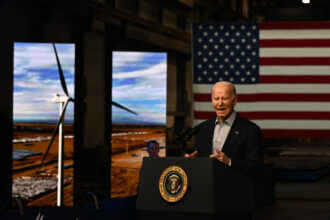The White House says it has reached a settlement in a longstanding legal battle with Native American tribes and conservation groups regarding 14 dams on the Columbia River basin. The historic agreement, which includes provisions geared toward the eventual removal of four of those dams, could end one of the nation’s most high-profile disputes over the future of hydropower and adds to a growing national debate over what should be considered clean energy.
The settlement agreement, announced Thursday, puts some $300 million toward salmon restoration projects in the Pacific Northwest, including upgrades to existing hatcheries that have helped to preserve native fish populations. The deal also includes a five-year stay on litigation and a pledge to develop upwards of 3 gigawatts of “tribally-sponsored renewable energy production.”
It will also fund studies examining how services and benefits provided by four dams on the Lower Snake River, a tributary of the Columbia River, could be replaced in the case that Congress approves their removal. The Biden administration said it expects the deal to spur more than $1 billion in new federal investments to wild fish restoration over the next decade.
“The historic agreement charts a new course, one that preserves options, is responsible to regional leaders and ensures Congress has the information it needs to best invest in and increase the resilience of the Pacific Northwest,” Brenda Mallory, chair of the White House Council on Environmental Quality, told reporters on a press call Thursday.
Tribes and conservation groups sued the federal government in 2021, arguing the dams it operated were largely responsible for the sharp decline of native fish in the Columbia River Basin, particularly salmon and steelhead trout.
Sixteen types of salmon and steelhead trout once flourished in the Columbia River and its tributaries across the Pacific Northwest, with upwards of 16 million fish returning to the river each year to procreate. But since the late 1800s, as dams were erected along the river system, those populations have plummeted. Four species of the historical fish populations are extinct, seven are endangered and just one remains close to its historical population.
Studies have shown that dams block fish from traveling upstream to their spawning grounds, interfering with their ability to reproduce. And as the rivers warm due to climate change, research shows that the dams also prevent species from migrating to more habitable waters.
“Many of the Snake River runs are on the brink of extinction,” Corrine Sams, chair of the wildlife committee of the Confederated Tribes of the Umatilla Indian Reservation, told Oregon Public Broadcasting. “Extinction cannot be an option.”
The lawsuit, along with its settlement this week, underscores an ongoing national debate over what role hydropower should ultimately play in the clean energy transition. Besides the ecological harms, a growing body of evidence also shows that the reservoirs of hydroelectric dams also release a significant amount of carbon emissions—particularly methane, a potent greenhouse gas that’s roughly 80 times more effective at warming the atmosphere than carbon dioxide over a 20-year period. Those emissions are the result of organic matter, including vegetation, dead animals and even fertilizer runoff, piling up in large quantities behind dams and decomposing in the reservoirs.
Not everyone was happy with Thursday’s settlement announcement. Republican lawmakers, hydropower operators and wheat farmers lambasted the move, saying it would raise electricity rates, reduce access to irrigation, interrupt barge traffic and negatively impact recreational benefits.
Several Republicans also accused the Biden administration of conducting the talks in secret, saying in a letter to President Joe Biden last month that “literally millions of Northwest residents were deprived of fair representation in this process.” Last month, the lawmakers leaked a draft mediation document for the agreement, accusing the administration of attempting to circumvent congressional authority.
But White House officials on Thursday pushed back against that narrative, stressing that Congress needs to act for the dams to be torn down.
“I think we have been clear throughout this process that this is a congressional prerogative and they will have to face this question,” White House senior adviser John Podesta said at the Thursday press event. “They need to face it with not just a sense of what might be possible but in a context in which not only have the studies been done, but the work begins to be done to provide additional clean, renewable resources that the region is going to need.”
More Top Climate News
COP28 Ends With Historic Deal—and Mixed Feelings: The United Nations’ annual climate summit ended in overtime Wednesday with mixed emotions from its participants and observers. Among the key highlights is the landmark deal to “transition away” from fossil fuels, which my colleague Bob Berwyn reports does not deliver a clear path to phasing out oil, gas and coal, angering island nations who were left out of the final talks. The agreement, Berwyn continues in another report, also gave the issue of biodiversity loss a larger focus than ever before. While many environmentalists were dissatisfied with the deal, arguing it kills the 1.5 degree Paris Agreement target, business executives welcomed the move, Reuters reports, saying it provides the clearest signal yet that the end of the oil age is nigh.
Renowned Climate Change Denier Hangs Up His Hat: Myron Ebell has been called “a superstar of the Denialosphere,” “enemy #1 to the current climate change community” and “one of the single greatest threats our planet has ever faced” by environmentalists and journalists. But the 70-year-old figure—whose advocacy work, including with the Trump administration, has been at the forefront of climate change denial for more than two decades—stepped down as director of the Competitive Enterprise Institute’s Center for Energy and Environment in August, E&E News reports.
Trump Promises to Renege on $3 Billion Pledge for Green Climate Fund if Elected: Donald Trump, the frontrunner for the Republican presidential nomination, said on Wednesday that if elected he would renege on a $3 billion U.S. pledge to a global fund meant to help developing countries cut emissions and adapt to climate change, Nathan Layne reports for Reuters. Vice President Kamala Harris had announced the financial pledge to the Green Climate Fund earlier this month at the COP28 climate summit in Dubai, though that funding would need to be approved by the politically polarized Congress.
Today’s Indicator
96,000 miles
That’s the total length of new pipelines required to achieve the federal government’s plan to capture carbon dioxide from power plants or suck it directly from the atmosphere with burgeoning technologies, according to the Energy Department. That’s enough pipeline to encircle the Earth four times.

















